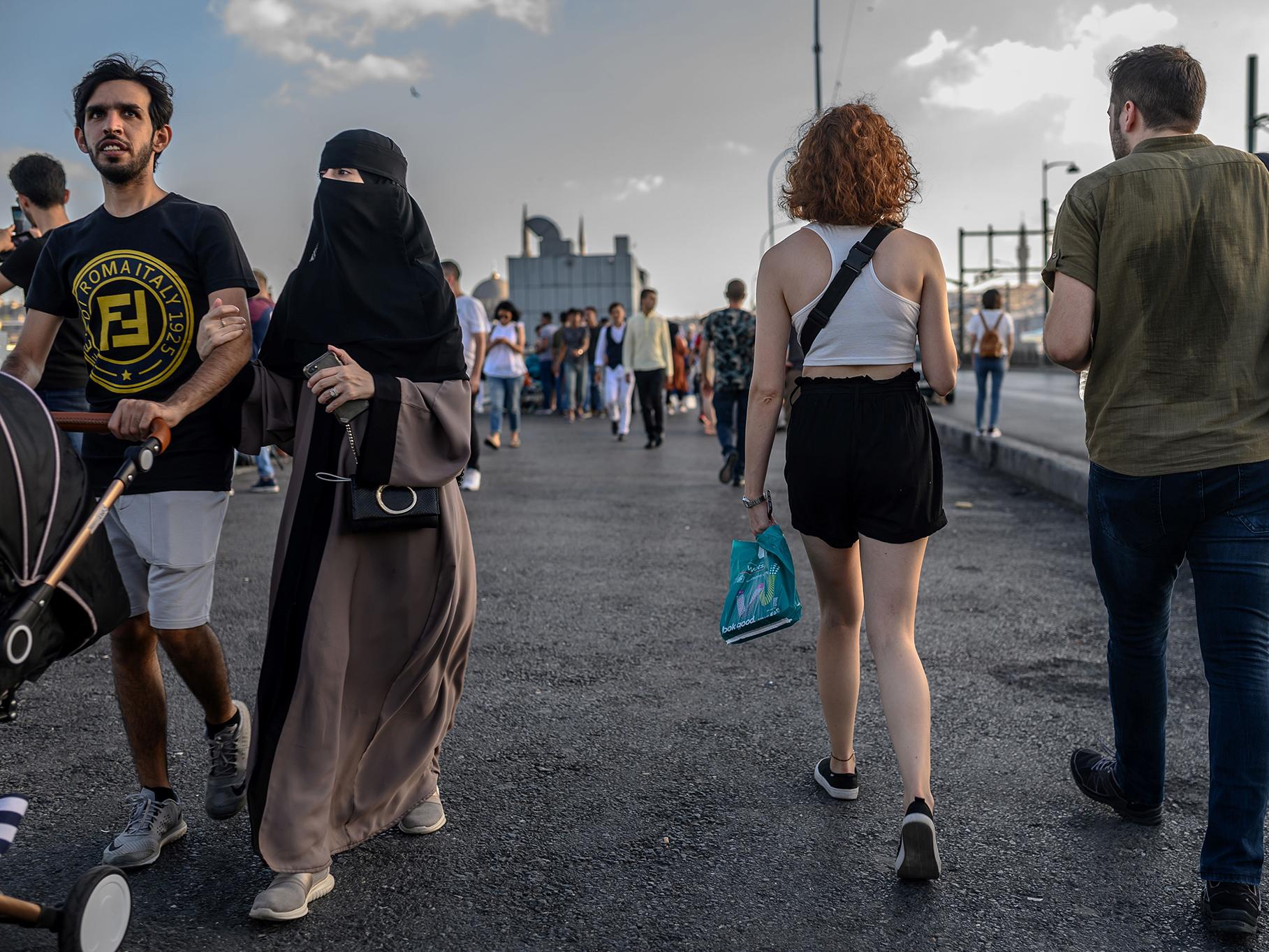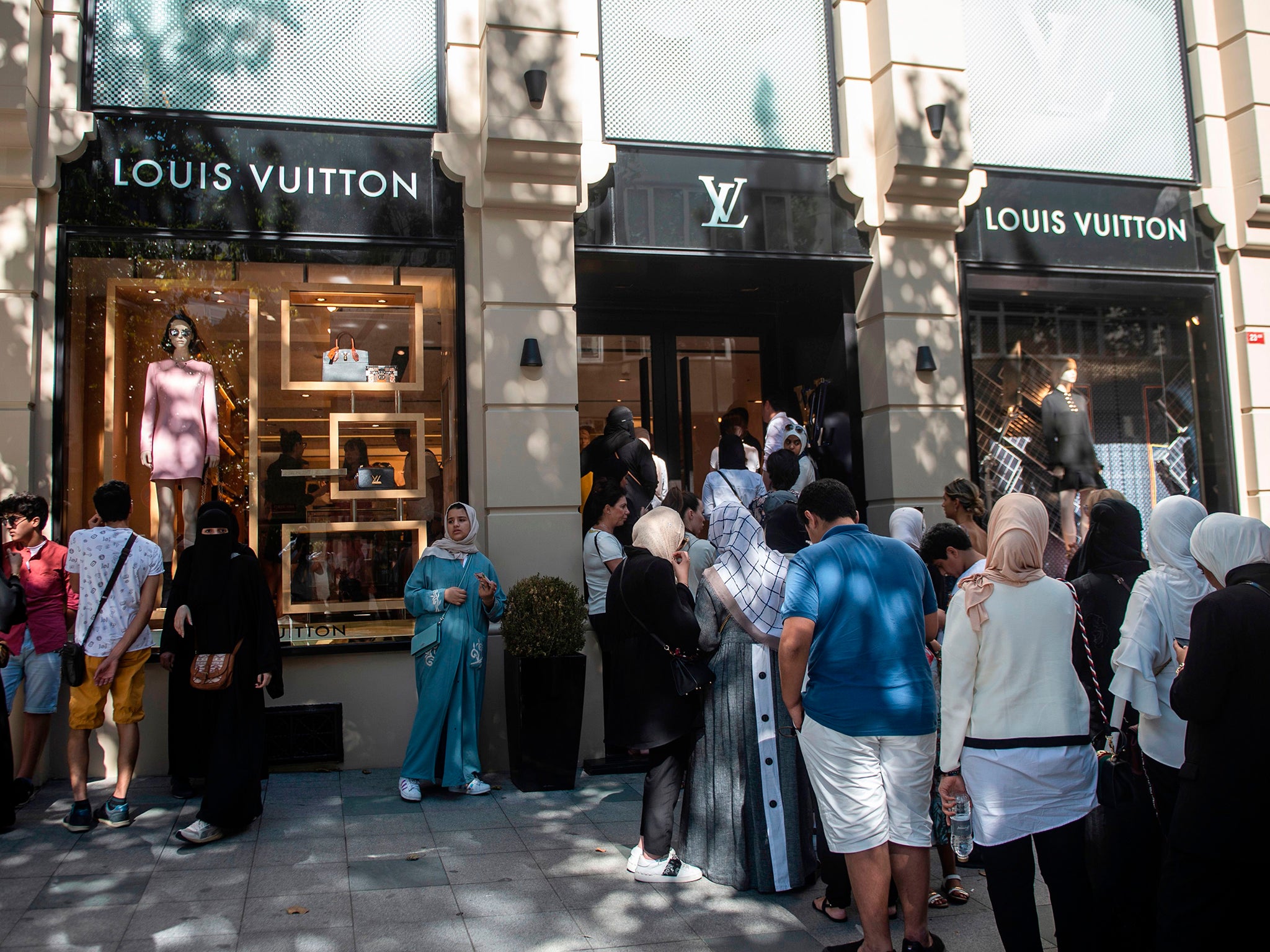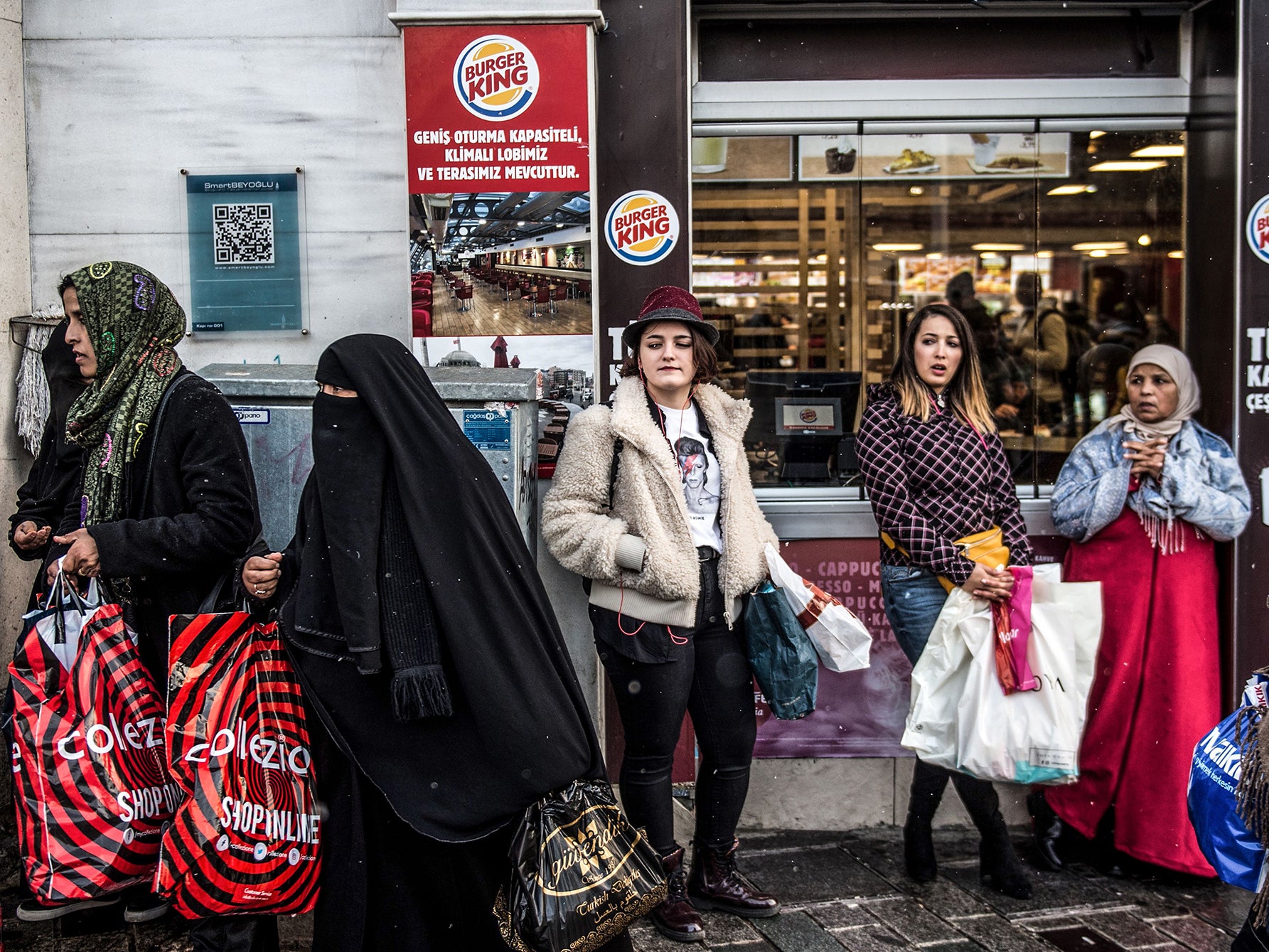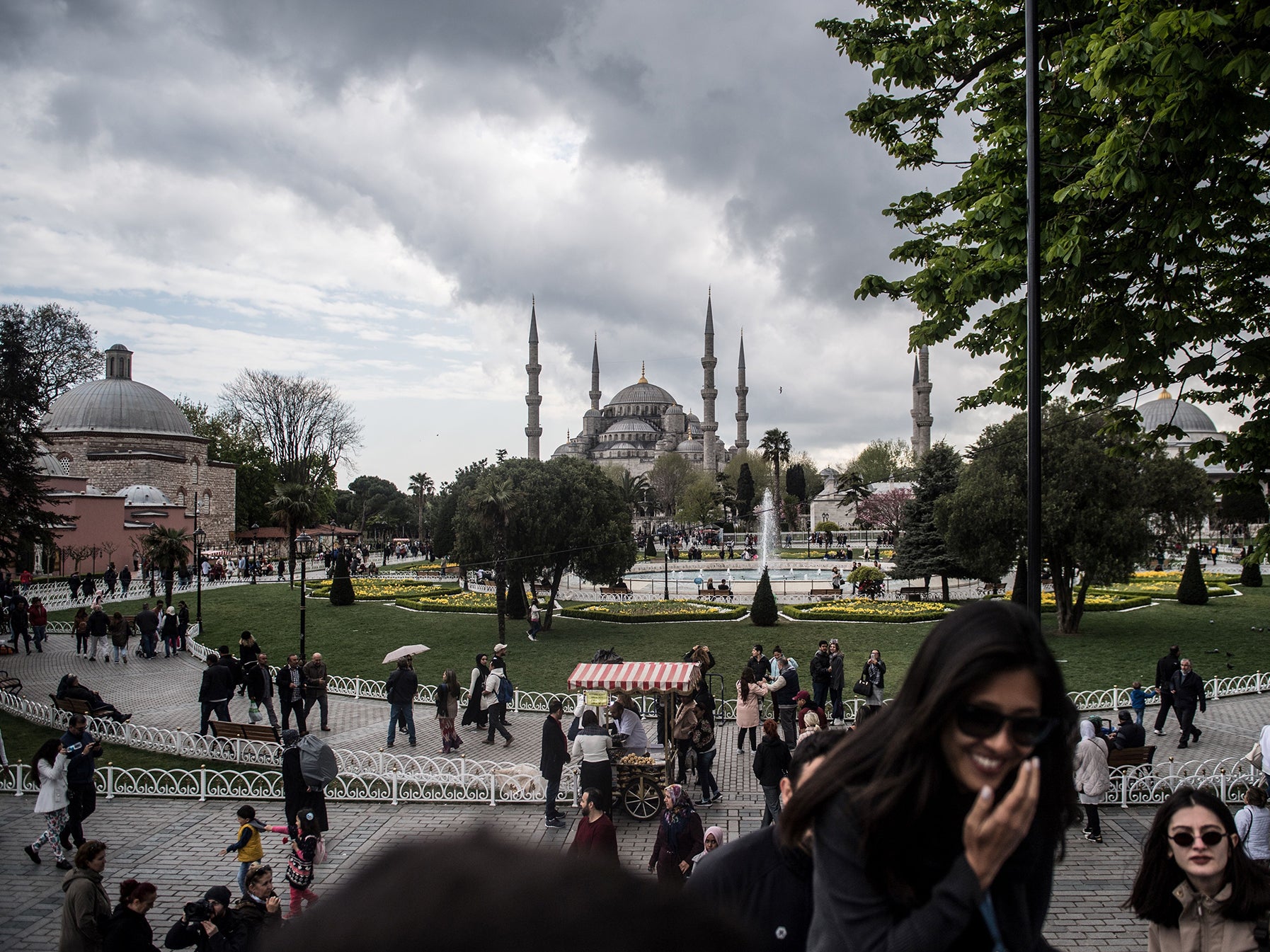The changing face of tourism in Turkey has burnt a vital bridge between east and west
Turkey has become a popular destination for Arab tourists who feel at home while enjoying the liberties of an almost European country. The surge has helped keep the nation’s struggling tourism sector afloat but, writes Sebnem Arsu, it’s also brought a cultural shift some locals believe it’s too late to reverse


This fresh breath of democracy, this air of relief, will have a positive impact on this city,” Istanbul’s newly elected opposition mayor said, as public boats gracefully crisscrossed the Golden Horn. “We’re going to start promoting tourism globally – in Europe, America, the Far East, the Middle East, and in Arab countries – triggering a massive tourist influx.”
Ekrem Imamoglu, the Republican People’s Party mayor, who took over the helm of Turkey’s cultural capital from the pro-Islamic Justice and Development Party after 25 years, was referring to dwindling numbers of European tourists visiting Istanbul. Some say the dramatic decline came after the country was pulled into a whirlwind of violence post-2015, while others suggest the religiously inspired policies of the government created the trend. In 2015, Turkey’s tourism industry took a sharp dive after a series of fatal attacks, cutting the number of incoming foreign tourists to a historical low of around 25.5 million compared to nearly 37 million in 2014.
The following three years of instability saw tourism investors either shuttered or struggling to survive until they discovered a niche in the market that had long been left unnoticed: the Arab and Asian holidaymaker. “There used to be a Middle Eastern market, but it was only after Western tourists deserted Turkey that their importance came under the spotlight,” says Huseyin Kirk, chair of the Middle Eastern Tourism and Travel Agents Association (Otsad). “They proved themselves to be the most loyal guests of Turkey as they brushed off security concerns, continued arriving even after the coup attempt and kept spending and investing in our country.”
Kirk’s organisation, founded with 40 members in 2015, all trying to discover and cater to the needs of Middle Eastern tourists, now represents 700 businessmen. While the European market still leads Turkey’s incoming tourism, comparative figures from the Ministry of Tourism confirm the rising number of visitors from west Asia.
In Istanbul, the hub of Turkish tourism, Arab tourists increased by 29.4 per cent from 2017 to 2018, while the Chinese held the record with a 66.2 per cent hike the same year, according to industry statistics. The influx was not solely because of President Recep Tayyip Erdogan’s popularity in the Arab world or the skyrocketing ratings of Turkish soap operas.
Uprisings in the Middle East or the Arab Spring – which started in 2011 with Tunisia and spread into Egypt and Syria – took these particular countries off the list of safe travel destinations.
Turkey stepped in as an attractive alternative where Arab nationals could feel – even partially – at home religiously and culturally while enjoying the liberties of an almost European country. “The coup in Egypt, following the events of the Arab Spring in 2011, reflected positively on Turkey’s tourism revenue as Egypt was the lead competitor in the market,” Kirk says.
“Additionally, Turkey is only 3.5 hours away from many of these countries, relatively cheap and has an unmatchable historical texture, all of which boosted our businesses.”
Although the shift helped the tourism sector stay afloat, it also brought along a cultural shift, which critics allege was severely incompatible with Turkish and European sensibilities.
Tourism in Turkey
The numbers
In 2015, western tourists totalled 19,102,424. By 2018, their numbers had declined by 9 per cent to 17,380,554.
During the same period, visitors from western Asian countries such as Saudi Arabia, Qatar, UAE and Iraq increased by 26.49 per cent, from 3,563,993 to 4,507,854.
In 2017, the worst year for tourism so far, the number of incoming European tourists dropped by 31.16 per cent, while Asian nationals increased by 0.81 per cent in the same period.
On a late afternoon in August, large groups of Gulf nationals fill Istiklal street, Istanbul’s famous promenade along the central Taksim neighbourhood, randomly stepping in and out of shops or stopping at cafes for nargile, or hookah, on side streets. Dozens line up in front of restaurants like Hatay Medeniyetleri Sofrasi, a kebab-shop chain that took over from Haci Baba, once a temple of classic Turkish cuisine.
A plasma screen plays a demo of the young owner slicing meat over a hotplate, while a large digital panel lists the menu specials; next door is a 19th-century Greek Orthodox church. “You should see this place at night, some days Arab tourists will wait for hours to get in,” says Kazim Oker, 49, the doorkeeper of a neighbouring building where the same chain opened another branch to control the competition.
“Things have changed. Westerners used to come here looking for our restaurants, our music, our museums but tourists from the Middle East have no such expectations. Now everything’s about them feeling at home.”

Beyoglu has already gone through a painful gentrification process where historical boutique shops were replaced with shopping malls and chain stores. Economic hardships forced landmarks to shut down while those wanting to survive went along with change. Today, hookah cafes, traditional Turkish Delight shops, conservative but flashy textile stores, and sandwich buffets advertise in Arabic and play oriental tunes, marking the cultural tone on Istiklal.
“Tourists on this street and beyond used to be welcomed by the traditions of the Ottoman, Turkish cuisine, but now, it’s the chicken shawarma buffets and kebab shops that host them,” says Turgut Gulen, sitting in the scarcely filled hall of Haci Abdullah Lokantasi. His family founded the restaurant in 1888 and has owned it at its current location since 1958.
On a regular day five years ago, there wouldn’t be a single seat available, almost all occupied by western tourists curious to taste the delicacies of Turkish and Ottoman cuisines, Gulen says. “If Europeans do not come, the chances of survival for culturally profound places like ours will be very slim. We would lose but so will the country.”
The cultural loss that businessmen such as Gulen hope to avoid has been overridden by tourists’ spending figures in a crisis conscious country. A year ago, the Turkish lira plummeted by one-fifth against the dollar and has been trying to avoid further falls since. According to Otsad statistics, one visitor from Saudi Arabia spent around $1,500 per day, compared to the $647 of an average western tourist.
We didn’t expect to find so many Arabs or such an Arab feel here. It didn’t look like the Turkey we had in mind. Turkey is more important as a country of equilibrium than as an Islamic one
“Consumption habits of the Arabs are different to the Europeans. They do not come here for cultural tourism, they come here to see the Prince’s Islands around Istanbul, lounge along the green plains of Bursa in the west or the Black Sea region, and do shopping,” says Atilla Tuna, founder of Antonina Tourism, famous for its cultural city tours for over 20 years. “It’s all about changing trends in tourism, nothing more. Thankfully, now that our country’s image is turning a bit more positive, we see western tourists returning – from the UK, America, France.”
His daily Istanbul Walk tours, which have never hosted any Arab tourists, had around 55 visitors a day in July – still low compared to their best average of 100 participants but better than four to no tourists three years ago.
Will Waggott, the chief of tour operator Thomas Cook, one of Europe’s largest tour operators, rated Turkey as the second most popular holiday destination for summer 2019. This year, his agency saw a 27 per cent uplift in flight-only bookings to Turkey, compared with last summer.
What kind of Turkey awaits western tourists occupies many critics’ agendas, with some arguing that Turkey’s new tourism profile misrepresents the country in irreversible ways.

On a hot Saturday night in August, mostly Arabs and Iranians frequent Istanbul’s Sultanahmet square, marked with the grand masterpieces of Byzantine, Constantine and Ottoman empires. A few western-looking groups speak Russian as they sit by a centrepiece fountain pool. By the tramway, the Sultanahmet Pub looks equally tranquil, in stark contrast to its heyday when the four-storey building would be completely booked out, filled with people sharing tables, tossing beer mugs and listening to pop music.
“We used to employ 65 waiters at this time of the year, now we’re only eight,” says Ceyhun Palak, 41, the owner and manager of the pub for 17 years, taking a seat at one of the empty tables. “It was a pub by definition; we served alcohol. Once westerners stopped coming and Arabs floated in, we first removed our wine stand then redesigned our menu, moving alcoholic beverages to the back pages.”
If Europeans do not come, the chances of survival for culturally profound places like ours will be very slim. We would lose but so will the country
For Palak, it’s too late to reverse the “Arabisation” of Istanbul or other touristic resort towns. “There’s no longer diversity or anything culturally Turkish when you look around,” Palak says, recalling the times his pub hosted celebrities like John Lennon and Elton John. “Now, it’s all about Arabs and everything that resembles their culture.”
Along the Hippodrome, where Byzantine emperors once enjoyed chariot races, a family of three enjoyed the sight of an obelisk, erected by emperor Theodosius I in AD390 but originally made for Thutmose III, ruler of Egypt in 15th century BC. “We came for the history of this city – it’s overwhelming,” says Mejda Bourbia, 59, a radiologist from Marseille in France, travelling with her husband and son. She always wanted to visit the home of the Ottoman empire that once reigned in her ancestral home Algeria.
The family brushed off security warnings about Turkey, concluding that they were more exaggeration than reality but rated the cultural profile they encountered as alarming. “We didn’t expect to find so many Arabs or such an Arab feel here. It didn’t look like the Turkey we had in mind. Turkey is more important as a country of equilibrium than as an Islamic one.”

Bourbia and her family were familiar with Middle Eastern ethnicities, able to coax out the differences between an average Turk and an Arab but not all western tourists are so savvy.
“Oh, are they not Turkish?” says Victor Vloeberghs, a 21-year-old aerospace engineering student from Belgium’s Leuven, in astonishment when he heard the approaching family with women dressed in black chadors – full-length cloaks typically worn by Iranian women – were from Saudi Arabia.
“It’s impossible for us to tell the difference. We felt like a minority here when cities like Paris, London are crowded with westerners. Here felt much more local and authentic.”

Such confusion is one thing Turkish tourism veterans fear will eventually turn off liberal-minded Europeans from holidaying here.
“In response to this new profile of tourists that have strong purchasing power, we’re compromising our core cultural resources and habits,” says Bahattin Yucel, a former tourism minister, pointing out bookstores and local restaurants that reopen as candy stores and hookah cafes to attract Arab tourists.
“Such a shift is not sustainable but if continued, we’d lose the group of consumers that come to Turkey for what she is.”
29.4%
the rise in Arab tourists in Istanbul 2017-18
Some, however, claim that apparent changes on the street might work to Turkey’s advantage. “A more orientalist look can also charm the western tourist,” Tuna of Antonina Tours says. “Arab women don’t walk around in chadors, anyway. They change into shorts, drink beer, wear mini-skirts; Iranians remove their veil. Turkey is a free society.”
Bodrum, the peninsula city where mostly Brits crowded until recent years, has also had its share of the changing cultural climate. “Our main clientele has always been British, along with a rising number of Russians,” says Harun Karadeniz, the owner of the Attache Agency, one of the first tourism establishments in the region.
“We had to look for alternative ways to tackle the crisis after 2015. I used to do business with one Istanbul agency bringing in Arab tourists, and am now working with 18 of them.”
Visitors from the Gulf might not be into the Unesco world heritage 10th century BC ruins of Ephesus. They might remain indifferent to the 8,500-year-old Hellenistic city of Pergamos, but they have stretched the tourism season from four to seven months of cruising, dining and shopping around the peninsula.
“Arabs make up 45 per cent of tourists in the first three months and dominate the rest of the season,” Karadeniz says.
“I go to Istanbul, see the influence of Arab tourism in many areas, which is not yet the case here. Out of 10, you’d still count three Brits, three Russians, two Germans and two Arabs.”
The 41-year-old investor, however, challenged the ministry statements on Europeans’ strong comeback. “My friends and I constantly talk about how business is going, and it doesn’t look good; we barely make ends meet,” he adds.
“No matter how perfect they paint the picture, we need strong campaigns, promotions for a real comeback in tourism.”
In the country where tourism plays a pivotal economic role, efforts to build sustainable and diversified tourist traffic overwrites cultural concerns, which Turkey’s ministry of culture and tourism even denies exist. “This situation (diversified tourist traffic) does not constitute any negativity in terms of our cultural heritage and values that play a major role in the promotion of our country,” the ministry said in a written statement to The Independent.
“On the contrary, it will help the global promotion and attraction of these values in a larger geography, and therefore will boost its input in the country’s tourism.”

The ministry planned to launch a new public agency to promote the country globally and has already conducted a massive international survey to measure individuals’ perceptions about Turkey, pinning down shortcomings before devising a fresh strategy, it added.
At a time when hotels, restaurants, tour operators, and other businesses connected to tourism seem to concentrate on short-term economic survival, some, like former minister Yucel, warn against the long-term repercussions of a cash-centred profiling in tourism on Turkish Anatolian culture. Downplaying such a phenomenon instead of owning it, as the Istanbul mayor Imamoglu did, was the least effective way to tackle the problem, he argues. “We, of course, have to welcome tourists from all around the world – west or east – but stand in equal distance to all,” the tourism veteran says.
“The imposition of any outside culture on us, however, shouldn’t be taken as normal because of the cash coming in. They'll be better off coming here to explore our culture as is.”
Join our commenting forum
Join thought-provoking conversations, follow other Independent readers and see their replies
Comments
Bookmark popover
Removed from bookmarks